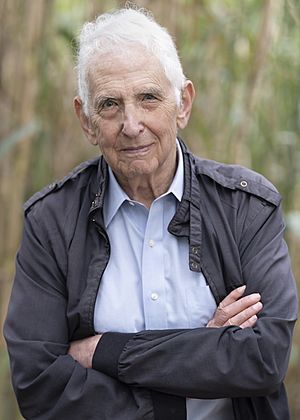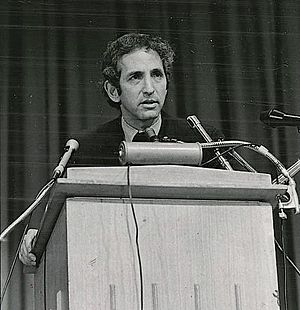Daniel Ellsberg facts for kids
Quick facts for kids
Daniel Ellsberg
|
|
|---|---|

Ellsberg in 2020
|
|
| Born | April 7, 1931 Chicago, Illinois, U.S.
|
| Died | June 16, 2023 (aged 92) Kensington, California, U.S.
|
| Education |
|
| Employer | RAND Corporation |
| Known for |
|
| Spouse(s) |
|
| Children |
|
| Awards | Right Livelihood Award |
| Military career | |
| Service/ |
United States Marine Corps |
| Years of service | 1954–1957 |
| Rank | First lieutenant |
| Unit | 2nd Marine Division |
Daniel Ellsberg (April 7, 1931 – June 16, 2023) was an American who worked as a military analyst and later became a political activist. In 1971, while working for the RAND Corporation, he caused a big stir across the country. He released a top-secret government study called the Pentagon Papers.
These papers were about how the U.S. government made decisions during the Vietnam War. Ellsberg gave them to newspapers like The New York Times and The Washington Post.
In 1973, Ellsberg was charged with crimes like theft and conspiracy. He faced a very long prison sentence. However, because the government acted improperly and gathered evidence illegally, all charges against him were dropped. This happened in May 1973.
Ellsberg received the Right Livelihood Award in 2006 for his work. He was also known for his studies on nuclear weapons. He supported WikiLeaks, Chelsea Manning, and Edward Snowden. In 2018, he won the Olof Palme Prize for his "courage."
Contents
Early Life and Education
Daniel Ellsberg was born in Chicago, Illinois, on April 7, 1931. His parents were Harry and Adele Ellsberg. He grew up in Detroit, Michigan, and went to the Cranbrook School.
Ellsberg earned a scholarship to Harvard College. He graduated in 1952 with a degree in economics. He then studied at the University of Cambridge for a year.
In 1954, he joined the U.S. Marine Corps. He served as a platoon leader and company commander. He left the Marines in 1957 as a first lieutenant. After his military service, Ellsberg returned to Harvard for two years.
Working at RAND Corporation
Ellsberg started working at the RAND Corporation in 1958. He became a full-time strategic analyst in 1959. His main focus was on nuclear strategy and how nuclear weapons were controlled.
He finished his PhD in economics from Harvard in 1962. His research looked at how people make choices when they are unsure. This idea is now known as the Ellsberg paradox.
From 1964, Ellsberg worked at the Pentagon. He was a special assistant to the Secretary of Defense, Robert McNamara. Later, he spent two years in South Vietnam. There, he worked for the State Department.
After returning from Vietnam, Ellsberg went back to RAND. In 1967, he helped with a top-secret study. This study was about how the Vietnam War was being fought. These documents later became known as the "Pentagon Papers."
Changing Views on the Vietnam War
By 1969, Ellsberg started going to anti-war events. He still worked at RAND at this time. He met peace activists who influenced his thinking.
In August 1969, he had a powerful experience at a conference. He heard a speech by Randy Kehler, who was going to prison for refusing to join the military draft. Ellsberg was deeply moved by Kehler's courage.
He realized that the government was involved in an unfair war. He felt he had to do something. This moment helped him decide to share the Pentagon Papers.
From 1970 to 1972, Ellsberg worked at the Massachusetts Institute of Technology. He continued to think about the Vietnam War. He believed it was not a "civil war" but an act of "American aggression."
The Pentagon Papers
In late 1969, Ellsberg secretly copied many classified documents. These became known as the Pentagon Papers. They showed that the government knew early on that the war was hard to win. They also revealed that the government had misled the public and Congress about the war.
Ellsberg tried to get some U.S. Senators to release the papers. He hoped they would share them in the Senate, where they could not be punished.
Release and Publication
Ellsberg also shared copies of the documents with others. He gave them to The New York Times reporter Neil Sheehan. On June 13, 1971, The New York Times began publishing parts of the 7,000-page collection.
The Nixon administration tried to stop the newspaper from publishing. For 15 days, The New York Times was blocked by a court order. During this time, Ellsberg gave the documents to The Washington Post.
On June 30, the US Supreme Court ruled that the newspapers could publish. This was a big win for freedom of the press. Two days before the ruling, Ellsberg publicly said he was the one who released the papers.
Senator Mike Gravel also put 4,100 pages of the Papers into the public record. He received them from Ellsberg.
What Happened Next
The release of the papers was embarrassing for the Kennedy, Johnson, and Nixon administrations. The Attorney General, John Mitchell, tried to stop The New York Times. The newspaper refused, and the government sued them.
The Supreme Court eventually sided with The New York Times. This ruling is seen as very important for First Amendment rights and freedom of the press.
In response, Nixon's White House staff tried to stop future leaks. They also tried to harm Ellsberg's reputation.
Trial and Dismissal
On June 28, 1971, Ellsberg publicly turned himself in to authorities in Boston. He admitted to giving the documents to the press. He said he felt it was his duty as an American citizen to share the information.
Ellsberg and his colleague, Anthony Russo, faced serious charges. They could have been sentenced to many years in prison. Their trial started in Los Angeles in January 1973.
Ellsberg tried to argue that the documents were illegally kept secret from the public. But the judge did not allow this argument.
During the trial, it was revealed that the government had acted improperly. They had broken into a psychiatrist's office to find information on Ellsberg. They also illegally listened to his phone calls.
Because of this serious government misconduct, the judge dismissed all charges. This happened on May 11, 1973. The judge said the government's actions had "offended a sense of justice."
These revelations were also part of the Watergate scandal. Several White House officials were later convicted of crimes related to Watergate.
Activism and Views
After the Vietnam War, Daniel Ellsberg continued to be an activist. He gave many speeches and spoke out about current events. His first book, Papers on the War, was published in 1972.
The Doomsday Machine
In 2017, Ellsberg published a book called The Doomsday Machine: Confessions of a Nuclear War Planner. In it, he shared that his main job from 1958 to 1971 was planning for nuclear war. He worked for several U.S. presidents.
He felt that U.S. nuclear war policy was very dangerous. He wanted to expose it, even if it meant going to prison. He had also copied documents about nuclear war plans, but they were later lost.
Awards and Honors
Daniel Ellsberg received many awards for his courage and work.
- He won the first Ron Ridenhour Courage Prize.
- In 1978, he received the Gandhi Peace Award.
- He was awarded the Right Livelihood Award in 2006. This award recognized him for "putting peace and truth first."
- He received the Dresden Peace Prize in 2016.
- In 2018, he won the Olof Palme Prize.
- He also received the Sam Adams Award in 2022.
Ellsberg Papers
The University of Massachusetts Amherst now holds Daniel Ellsberg's personal papers. These documents are important for studying his life and work.
Personal Life
Daniel Ellsberg was married twice. His first marriage was to Carol Cummings in 1952. They had two children, Robert Ellsberg and Mary Ellsberg. They divorced after 13 years.
In 1970, he married Patricia Marx. They had a son named Michael Ellsberg.
In March 2023, Ellsberg shared that he had pancreatic cancer. He passed away at his home in Kensington, California, on June 16, 2023.
Films About Daniel Ellsberg
Several films have been made about Daniel Ellsberg and the Pentagon Papers:
- The Pentagon Papers (2003): This historical film stars James Spader as Daniel Ellsberg. It shows his work at RAND and his trial.
- The Most Dangerous Man in America: Daniel Ellsberg and the Pentagon Papers (2009): This documentary explores why Ellsberg leaked the papers. It also covers the media's reaction and the Nixon administration's efforts against him. It was nominated for an Academy Award.
- Hearts and Minds (1974): This documentary about the Vietnam War includes interviews with Ellsberg.
- The Post (2017): This historical drama is about The Washington Post fighting to publish the Pentagon Papers. Matthew Rhys plays Ellsberg in the movie.
- The Boys Who Said NO! (2020): This documentary is about the draft resistance movement during the Vietnam War. Ellsberg is interviewed and talks about how resisters influenced his decision.
See also
 In Spanish: Daniel Ellsberg para niños
In Spanish: Daniel Ellsberg para niños
Images for kids
-
Fielding's filing cabinet, with marks from the break-in, on display at the Smithsonian National Museum of American History
 | Selma Burke |
 | Pauline Powell Burns |
 | Frederick J. Brown |
 | Robert Blackburn |






